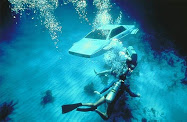I saw Nolan’s new film before it was released here in New Zealand, but I held off writing a review of for two reasons: firstly, I was suffering from a brain-splitting migraine when I first saw it and secondly I felt it to be an injustice to critique the film after only one viewing.
It’s a strange affair to watch this film with a headache. The film itself is a headache, like a splinter in your brain pushing itself deeper and deeper into your grey matter, before being absorbed by your subconscious. After two hours I was confused whether the pain in my head was physical or a symptom of the spiralling narrative strands in Christopher Nolan’s heavy screenplay. To add to the perplexity, Hans Zimmer’s otherwise sublime score drowns out the occasional line of dialogue in the final act, leaving you straining to make sense of one character’s line whilst the next line is being spoken.
Thematically,
Inception is closest to Nolan’s first film
Memento than any of his more recent works. It’s a headfuck on celluloid, and you can’t really say that about his two Gotham City films.
Batman Begins and
The Dark Knight might be brainier than your average blockbuster, but they still follow traditional narrative structures. It seems that for these other films, Nolan is seeing how far he can take his audience down the rabbit hole without leaving them completely dumbfounded.
That’s not to say that there isn’t a fair bit of hand-holding in this film. We get one fairly hefty opening scene, where we don’t know what the hell is going on, followed by what seems like scene after scene of endless exposition, as Cobb (Leonardo Dicaprio) teaches Ariadne (Ellen Page) – and us, of course – about the technology that allows his team of specialists to operate within other people’s dreams. Under a different director, Terry Gilliam say, we wouldn’t have the benefit of an explanation until mid-way through the second act. Once we are along for the ride however, Nolan refuses to let the film, or the audience, breathe. It’s refreshing to see this in a major blockbuster. The last time we were tested by such a challenging narrative was
The Matrix, although even this 1999 film looks tame now that the rest of Hollywood has caught up to it.
Casting-wise, Nolan’s films keep going from strength to strength. Alongside Dicaprio and Page, the team is rounded out by Joseph-Gordon Levitt, Tom Hardy, Dileep Rao and Ken Watanabe. Watanabe, the decoy Ra's Al Ghul from
Batman Begins is only one of many returning Nolan alumni, with Michael Caine and Cillian Murphy also appearing. Rounding out the ensemble cast is a criminally underused Pete Postlethwaite, a criminally unrecognisable Tom Berenger (I had to watch the film twice to figure out who Berenger was playing) and a bewitching performance by Marion Cotillard. Thankfully, Nolan doesn’t dwell on the romantic aspect of the script, keeping the twisted love-story between Cobb and Mal (Cotillard) to a welcome minimum.
I was half-expecting Ellen Page to be well out of her depth in a film like this – her know-it-all egotism has made her a two-dimensional character in everything I’ve seen her in – but it’s really Gordon-Levitt who resembles Nolan’s greatest casting faux pas. Watching him trying to hold his breath above water amongst an otherwise powerful cast is pretty uncomfortable. Leonardo Dicaprio used to occupy this role – an almost prepubescent frame motored by a whining and nasal voice – until a glass ashtray smashed over the head of a barfly in The Departed announced his newfound masculinity. It almost seems like Nolan is trying to remind us of Dicaprio’s embarrassing past by casting Gordon-Levitt next to him.
More than anything,
Inception is just
The Sting for the 21st century, with less jaunty piano music. Fortunately the mood isn’t lightened by endless repetition of Scott Joplin’s
The Entertainer, with
Inception’s only recurring piece of popular music (Edith Piaf’s
Non, Je Ne Regrette Rien) being the film’s best in-joke (Cotillard played Piaf in 2007’s
La Vie En Rose).
I’ve already heard talk about a possible sequel – the characters are ripe to revisit - but I hope that it really is just speculation (look what happened to those
Matrix sequels). Nolan doesn’t seem to be averse to sequels (he’s now preparing his third and final Batman film) but hopefully he’ll see the merit of leaving
Inception to remain as a standalone piece of work. Part of the appeal of
Blade Runner is that there’s no
Blade Runner 2.
The film seems to have divided public opinion. A friend claimed that he fell asleep and dreamt that he saw a good film. I would say that if anything, it’s too clever for its own good. This is not a film that deserves to be seen, it’s a film that deserves to be seen twice.















